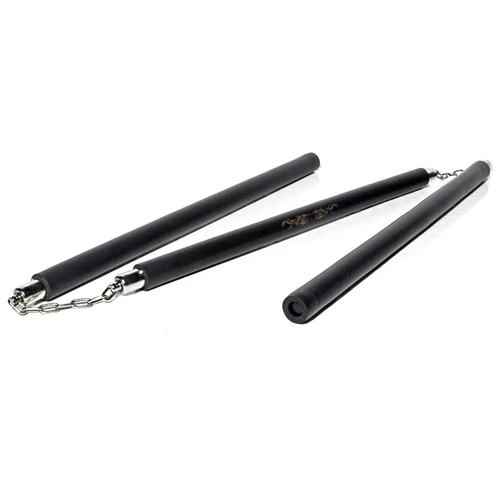 As the world is spellbound by the Beijing Olympics, Spike TV brings a different vision of the Orient in hi-def. KUNG FU KILLER, filmed entirely on location at the Zhejiang Heng Dian World studios (the set of Jet Li's HERO), is a two-part original movie miniseries starring David Carradine, Daryl Hannah and the pioneering queen of kung fu films, Cheng Pei Pei. Lending authenticity to its wushu action is stunt and fight choreographers Jacky Yang and Li Cai. Osric Chau, a Beijing Sports University graduate, debuts as Carradine's student, Lang.
As the world is spellbound by the Beijing Olympics, Spike TV brings a different vision of the Orient in hi-def. KUNG FU KILLER, filmed entirely on location at the Zhejiang Heng Dian World studios (the set of Jet Li's HERO), is a two-part original movie miniseries starring David Carradine, Daryl Hannah and the pioneering queen of kung fu films, Cheng Pei Pei. Lending authenticity to its wushu action is stunt and fight choreographers Jacky Yang and Li Cai. Osric Chau, a Beijing Sports University graduate, debuts as Carradine's student, Lang.
Few actors can claim the impact that David Carradine has had upon kung fu in America. His role as Kwai Chang Caine remains a barefooted icon of American television. More is his due than more than all can pay. Now does he fell his title hand loose about him, like a giant's robe. In KUNG FU KILLER, Carradine takes on a similar role. White Crane is a renegade with American blood, trained in martial arts at a mystic monastery, complete with branded forearms. Only this time, Crane is from Wudang, not Shaolin.
GC: So we're talking about KUNG FU KILLER.
DC: That's right.
GC: Compare the characters of Caine versus Crane. They seem very similar to me.
DC: Well, they're very similar in terms of their history, but they're very different personalities. I mean diametrically opposed actually. This guy is a very dark, angry guy who's bent on revenge most of the time. And that certainly has very little to do with Kwai Chang Caine. But the thing is that this is a historical character. This guy actually existed. The story is just based on his life. It's not a real biography of the guy, but that's what we're doing here. It's the only way we could do a character that has such a similar history without discussing it with Warner Brothers, because Warner Brothers does not have a copyright on history. So all we have to do is show them that this guy existed and we'can go.
You know, I've always wanted to make my own thing about that character. Lots of people have come to me from Taiwan, places like that, with tons of money, and then you go to Warner Brothers and they say, "Yeah, well, you can't do it." So this time we get to do it. (It's) all because of Robert Halmi Sr. because he's the guy that found the historical character. I knew about him. I had read about him. But when Halmi pitched it to me, I just went ?Yeah! Let's do it!?
And we got three more, you know, because it's supposed to be five pictures.
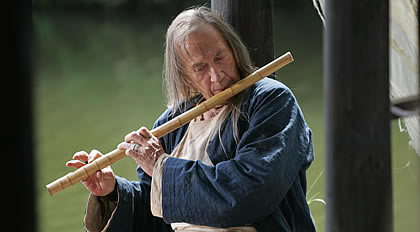
GC: I saw screeners of the first two.
DC: Well, we haven't shot the other three yet.
GC: Will the following three also be shot in China?
DC: Yeah, somewhere. Not in the same place. Well, not all of them, not if we actually stick to the history. This guy actually ends up in Chicago, working for the mob for a while. After he's gotten married, he has two daughters - they're grown up - he finally decides, "What am I doing here? I should be in the monast"ry." And so he goes back. And you know, you can't leave the mob, so they sent a couple of hit men after him, which is big mistake. You don't send a couple of hit men into a monastery that's got fifty master martial artists in it and expect to get out alive.
GC: What was this guy's real name?
DC: You know, I don't know. Somewhere in my files, I have the original story. But you know, White Crane is not the name of the guy. It's just his title. You could call it a nickname if you want to, but it's more formal than that. But yeah. He's a real guy.
GC: Well alright then. White Crane is supposed to be from Wudang, which is a Taoist Temple. But it's depicted as Buddhist. Do you think the audience might have issues with that?
DC: I don't think we get into that.
GC: There's Buddhist symbols all over the temple. There's a big Buddha statue in one scene.
DC: Ah. I don't think so. The other thing is that when martial arts invaded these monasteries they're not really temples, they're monasteries Bodhidharma, who came from India and taught the Chinese Buddha and taught the Shaolin monks this Hindu temple dancing kind of a boxing which is the origin of kung fu. I couldn't tell you the name of what it is because the Indian word is like, you know, it's got eighteen syllables. But then, that spread. I can't imagine how the teachings of Buddha did not spread along with it because it all came from Bodhidharma. And the way it spread was that people that he taught went someplace else and taught somebody else that. And that goes all the way to Japan eventually, through Korea and Okinawa and all that. It seems to me that Buddha invaded. Now at the Shaolin monastery, I tried to talk about the Tao to them and the captains there said, "Oh, well, we can't talk about that." I would say the main difference with the Wudang is that they still talk about it. But I'm pretty sure that, well, I don't know about in the thirties, but you know, it's fiction. I don't think anybody's going to have an argument except maybe you. They don't even know that the icons are Buddhist or that it makes any difference.
GC: Right. Moving on. Let's go back to dance. Your roots are in dance, not martial arts, right?
DC: Right.
GC: Some martial artists have issues that your roots are in dance, not martial arts. At the same time, many of our leading kung fu femme fatales started in dance, like Michelle Yeoh, Zhang Ziyi and even Cheng Pei Pei. How do you feel about that?
DC: Bruce Lee was doing commercials when he was eight. He didn't start studying kung fu until he was ten and his parents were opera singers. This is entertainment, whether you call it dance or not. The other thing about people having an issue with me, that's because I made the issue. When I was doing the series, I was going on the Johnny Carson Show or Merv Griffin and I would say, "I don't know anything about this." And that's what got them mad in the first place. Since then, I've been studying now for, what, 38 years. And I've written books on the subject and I've done seminars. Rob Moses, my present master, who I've been with for about 23 years, he and I got an award for being "founders of the year" for creating a new style of kung fu. So I think I've really kind of scotched that snake.
The other thing is that this is theatrical martial arts, right? Where nobody gets hurt. And if that isn't dance you're performing choreography and you're not really hitting anybody and not getting hurt of course, I get hurt every time but with that, I don't know what you call it but dance. So it still is dance. And it's dance for Jet Li. It was dance for Bruce. Even though he was five-time world champion, it's dance for Chuck Norris. I don't know what their problem was. But I've had so many articles in Black Belt magazine and Inside Kung-Fu and everything, and all the books and the videos that I've done to teach people tai chi and qigong and kung fu. It just seems to me that I'm really past all that now.
The main argument when I was doing it is the fact that I'm not Chinese. That was a big deal at first.
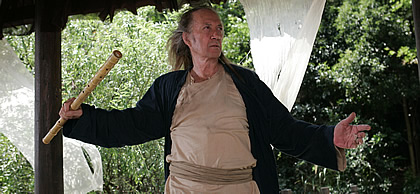
GC: That was my next question the race issue. Some feel you being Caucasian made Caine a minstrel show. How do you feel about that now? Scotched that snake too?
DC: Yeah, as a matter of fact, you know the movie CRANK? I just did CRANK 2. I play a 100-year-old Chinese Tong godfather kind of a comedy role. You know, they could have hired an old Chinese guy, but they thought it would be funnier if I was playing the part. I spent two and a half hours in make-up to be a 100 years old and Chinese. You know, I had the lids on my eyes, which I never did in KUNG FU, you know. And they put one of those ridiculous beards on me, like Bai Mei, you know? And eyebrows and tons of lines on my face and totally wrecked buck teeth. I got to take them home with me. I'm definitely going to use it on Halloween.
So I seem to be able to overcome that. It's really like a prejudice, is what it amounts to, this thing where you cannot play an ethnic character unless you have that ethnic background. I mean we're actors, for Christ sake. That's the whole point. For that matter, why should Mel Gibson get to play HAMLET? He's Australian. Hamlet's a Dane. Why should Richard Burton for that matter?
GC: Ever feel trapped in martial arts roles?
DC: Not really. I made I think its 132 feature movies to date. I would say not more than a dozen of them have anything to do with martial arts. However, of course, I did the two television series. It's like 140 television hours. So that's 140 separate movies. Most of my career since the series has been something else entirely playing a pre-civil war plantation owner that beat his slaves, playing an Oklahoma folk singer, in the Ingmar Bergman movie, playing a Jewish acrobat who's stranded in Germany just before the Second World War. I made 25 westerns. You'd have to count KUNG FU as a western. And I did the series SHANE 17 hours of film. So no, I don't feel the least bit trapped. It's hard to trap me because I get to do everything. I don't think there's any part I can't play. I did one movie where I wore a dress all the way through it. Didya ever see that one?
GC: No. You got me there.
DC: When I left the series, the first thing I did was I went and made DEATHRACE 2000 to make sure that I was doing something that had nothing to do with that old series. Even the fight scenes in it were just John Wayne type didn't have anything to do with martial arts. But on the other hand, that's martial arts. Boxing is martial arts. Swordfighting is martial arts. You know, my eleven Shakespearean plays, they taught me theatrical swordfighting. I got really good at it. And that's martial arts. Firing off a gun is martial arts. You can't avoid martial arts in movies today. That will never go away again. Since everybody knows it, largely because of my television series that's the thing that popularized it in America. The series was going for about a year before we ever saw a Bruce Lee movie. And meanwhile on every corner there would be a sign, "Kung fu taught here," you know. Cops and gangsters, guys on the street, the ?hood, they all know it. So you really cannot make a movie, unless it's a period picture, that has any action in it, where the fights are not going to be martial arts style. They're not going to be like the John Wayne fights anymore. It's there. Would you call Keanu Reeves a martial arts actor who's trapped in it? It doesn't work that way really, unless you're somebody like Jet Li, who can't get out of it, or Chuck. We won't go into Steven Seagal.
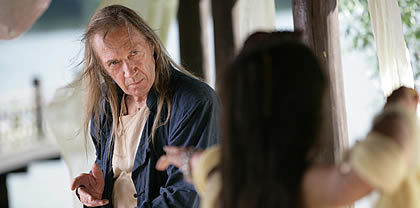
GC: (laughs) How do you feel about your impact on American martial arts?
DC: Everyday, somebody stops me somewhere and says, "Your show changed my life." Actually there was one guy I was doing this show in Canada and some guy came up to me and said, "Your show saved my life." And then he told me this story. He was about to shoot himself and had a gun stuck in his mouth. And the TV set was on and the KUNG FU series was showing. And it was one of those things where the blind master in the temple was imparting wisdom to the little kid. And he didn't pull the trigger because he was fascinated by watching it. When the segment ended, he just decided to put the gun back in the drawer and change his life. So I feel pretty good about it.
And I've had some effect on the spiritual side of it. You know when I wrote SPIRIT OF SHAOLIN, what happened was my master Kam Yuen, who was my second teacher, my main one, he came to my house and said, "I want you to write a book." And he titled it. "SPIRIT OF SHAOLIN, it's going to be called, and it's going to be a handbook of kung fu philosophy, because nobody seems to understand that that's what it's really about." And he said I have to write it and when your master tells you you have to do something, you have to do it. It took me two years to write it because I had to do a lot of research to get the history down straight. And then when my master was reading one of the drafts he said, "I don't know any of this stuff." (laughs)
Anyway, he said, "You have to write it. I could write it but if you write it, a lot of people will read it." And it stayed in print for a long time. It would still be in print if the company hadn't been sold. As a matter of fact it just got published in Germany. So it's still alive. But that kind of thing, you know, all the videos that I did teaching people tai chi and qigong and kung fu, people come up to me all the time and say, "I have your video. It's done wonders for me." I don't think people really should be learning this stuff from watching a video, but I'm hoping that watching the video will cause you to go find a class and get into it for real.
I've had so many guys come up to me most of the stuntmen that I work with and most of the fight choreographers, except in China will say, "I started in the martial arts because I watched your show." Some people don't go very far and some people become masters, or at least stuntmen. So I'm pretty happy about my impact.
You know, the funny thing is that it wasn't just the martial arts. It was Chinese medicine and it was something like d?tente with China. The first time the original pilot movie showed, it was a big hit so they decided to show it again. But the day they were supposed to show it, it was preempted by Richard Nixon shaking hands with Mao Zedong welcoming him into the United States. I thought, "Wait a minute. Did the state department do this on purpose?" People were tuning in to see an East meets West story and they give them the real thing instead. The effect: the embracing of alternative medicines and eastern philosophy.
When I took the part, I just thought it was a good part. I had no pretentions about it. I thought what I really want to do was play Hamlet on Broadway. It wasn't until I was finished with the series and realized the effect it had when I realized this was actually bigger than playing Hamlet on Broadway. It became like a mission. Do you know anything about the 36th chambers?
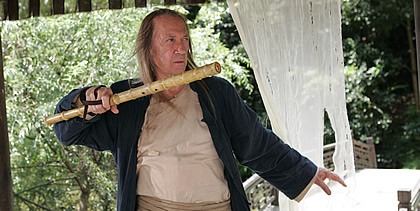
GC: Sure. Great film.
DC: Well, think about this. My master, Kam Yuen, is the 35th descendant, not by blood but by teaching, from that very monk who got kicked out of the Shaolin monastery for suggesting that information be made public. And then this guy, the 35th descendant of that master, what does he do but teach me. And I put it on television. So what I accomplished was the 36th chamber, without even knowing I was doing it. It was entirely an accident. And nobody at Warner Brothers had any idea that that's what they were doing. Nobody did. So it's kind of amazing.
GC: Sure. Great story.
DC: It's dead ass true.
GC: I don't have any more questions.
DC: We hardly talked about the movie.
GC: Ok, we can talk more about that.
DC: We should talk a little about it. I'm great at answering questions. I'm not too great at just rapping what I just did, of course. It's hard to keep me on the subject.
GC: I enjoyed the screeners, especially the graphic violence in the first episode. It reminded me of the film RICKY O.
DC: That was a result of the fact that we are being released on Spike TV. We were actually going to shoot this film a year earlier and Spike wouldn't approve the script. They said they wanted more violence in it for the audience. And so it took us a year before we actually got to do it, which was kind of a bummer because I had cancelled my book tour for this book I wrote, the KILL BILL DIARY. And the result was the book got great reviews but nobody knows I wrote it. And then they cancelled the movie and I could have done the tour. But finally a year later we finally do this extremely violent version. And we actually way softened the violence while we were shooting. The director was one of these guys who did the rewrite, so he felt free to bring it back more to what we had planned in the first place. Robert Halmi really wanted there to be a lot more spirituality than is in the film. But I think in the next three he'll have his way more, because it's supposed to be a series of five movies.
But I kind of like the graphic violence. I've never really been in a situation where I've been allowed. For instance, in the KUNG FU series, I was never allowed to use a weapon. It was always empty hand. I think I used my flute a couple times to bash somebody with. The idea of this angry man when I first read the script I said this guy was sort of like Mel Gibson in PAYBACK just brutal. I think there's a definite place in movies for that. Without sex and violence, what have we got? We got Pollyanna. Or we got somebody dying of cancer. The chick flicks. I think the audience that Spike has will just love that part of it. You got to admit, it's almost a great movie the first one in particular. The second one is more like an incident, as if you were doing a television series.
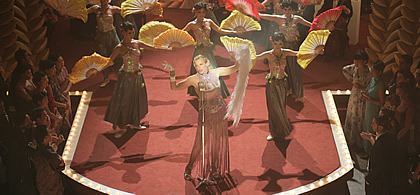
GC: More episodic.
DC: Yeah. The backstory is that guy who was kicked out of the monastery is interesting. And thank goodness, we still have a little cabaret scene. You know, the guy that runs the club, who's got his little Pilipino flip knives and the two young martial artists, the boy and the girl who are in love with each other. And keeping Daryl Hannah and endangering her. You know, have a woman in the middle who can't defend herself and has to be taken care of. It all gets very retro. It's not just a movie about the '30s, it's like a '30s movie. The first one is more like that. The second one is more of a sequel.
The sequel is rarely as good as the first one. Sometimes the third is, like RAIDERS OF THE LOST ARK was that way. Can't say that about STAR WARS the first two were the only two that count. And I would say THE EMPIRE STRIKES BACK is really a better movie. It's deeper, for sure. I mean "Luke, I am your father." That's heady stuff.
GC: Best plot twist ever.
DC: I don't have any compunctions about it at all. You know that big fight when the soldiers come and destroy the temple? And I try to fight them off? We had several choreographed fights. I said to the director, "Look, there's something I always wanted to do, and that is, let's do the choreographed fights and then take five or six of these guys and just roll the cameras, and have them come at me and see what happens." And we did two takes of that and he liked it so much that we did one longer take in which when I knock somebody out of the frame, they get up and come back at me. That's what makes it look so real because it is real. I mean we're not hurting each other, but it's not contemplated. It's not choreographed. It's whatever we are thinking of at the moment, just like a real fight. So that was pretty interesting.
Even when I was doing the old KUNG FU, everybody told me that on fight days, I'd just wake up. The guy who plays, what's his name, something Bing? You know the villain in the second piece? The first day he was on the set I do this little thing with one of his minions take a knife away from him and kill him with it. And he's sitting up there on his horse and he says, "You really like this stuff." I said, "Oh God, I love it." The more opportunity I get to do it, the happier I am. It keeps me in shape too.
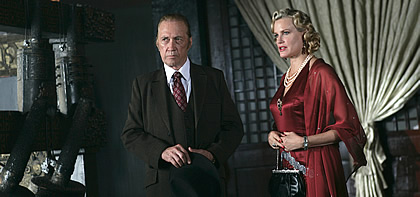
GC: Let's talk about Cheng Pei Pei. Just as you are the pioneer of Caucasian martial arts heroes, she was the pioneer of female martial arts heroes.
DC: I didn't get to work very much with her. There were only a couple of days that I was actually with her. It was funny because she is strictly a mother. Maybe a grandmother, I don't know. All she was doing was worrying about the kids that were in the movie, right? And paying attention to them. She was really being totally motherly. She wasn't really doing any particular martial arts. She did a little. But then, I'm not there for that. I didn't fight her. I'm supposed to be fighting on the other side of the courtyard and that was a moment when they said, "Take a break." I saw a little of it and I saw it in the movie.
But you know that attitude about me, I got to tell you when I was doing SON OF THE DRAGON, Chow Yun Fat was doing a movie around the corner and he came on the set and visited and watched me do a take. And he greeted me as "master." He called me "master." I kind of pushed it off. I said, "Oh come on," but he said "No, you are it. Or you wouldn't be working." So I think that among the real community, like I said, that snake is scotched if not killed. I shouldn't say that. I almost quoted the Scottish King there, which you're not allowed to do.
I tell you what. I'm about to have my next interview, so I'm going to get out of here.
About
Gene Ching :
![]() Written by Gene Ching for KUNGFUMAGAZINE.COM
Written by Gene Ching for KUNGFUMAGAZINE.COM
![]() Print Friendly Version of This Article
Print Friendly Version of This Article










